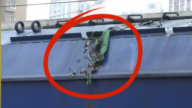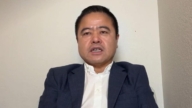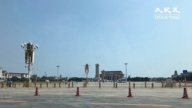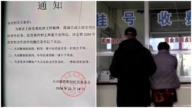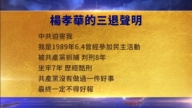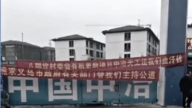【新唐人2013年07月17日訊】全球知名製藥企業「葛蘭素史克」在大陸涉嫌行賄案持續延燒,而中國醫藥領域中的「黑金」問題,也再次浮出檯面。中國的藥品從生產到患者手中,需要經過藥廠、經銷商、政府、醫院、患者等五個環節,如果每個環節在價錢上都往上添一筆,那麼可以想像,最後買單的患者,得花多少血汗錢。
「葛蘭素史克中國投資有限公司(GSK)」,四名高管因涉嫌嚴重經濟犯罪,被警方以涉嫌「商業賄賂和涉稅犯罪」採取刑事強制措施。15號晚間,「葛蘭素」英國總公司在官網發表致歉聲明,表示羞愧與道歉。
「葛蘭素史克」中國分公司副總裁梁宏等四名高級主管,涉嫌透過虛報會務費,一方面從承辦旅行社收取回扣,另一方面,以浮報的金額行賄大陸醫院及官員,讓藥品進入醫療體系。這些錢有的以現金直接回扣給高管,有的則繼續留在旅行社帳面上「備用」。
「葛蘭素史克」在中國最大的收入來源就是藥品銷售,醫藥商業賄賂目標是政府官員、醫院、醫生,還有一些基金會,這些行賄成本幾乎都轉嫁到藥價上。一顆原本30元的藥,到患者手上可能暴增為300元。
中國衛生法學會理事、中國東南大學法學院教授張讚寧:「外國的藥商廠商,他想打入中國的醫藥市場,不賄賂中國官員那是根本打不進去的,而且中國官方的操作往往是暗箱操作,是不公開的,他是不屬於醫院的,不受監督的。」
中國衛生法學會理事張讚寧,本身也是「東南大學法學院」教授,他說這個問題從側面反映出中國制度性腐敗的現狀。
張讚寧:「因為醫療行業的商業賄賂,那個醫生往往都是被動的接受,而不是主動的去索取,但是官方的那種商業賄賂,一般是有權力在後面起作用,如果你不賄賂他,你就根本辦不成任何事情,這是有本質區別。」
中國大陸從上世紀90年代至今,已發生多起國際性跨國商業機構在華涉嫌商業賄賂事件。
例如﹕「美國輝瑞製藥公司」去年8月受到美國證交會的處罰,就是因為公司向中國的醫藥部門及公職人員行賄。再有「西門子醫療集團」於2003年至2007年間,曾向5家中國醫院支付了超過千萬美元的賄賂臟款。其他還有摩根士丹利、IBM、朗訊、沃爾瑪、德普、艾利•丹尼森等都曾在華涉嫌商業賄賂。
在中國,藥品價格包括成本價、出廠價、批發價、招標價、政府指導價、醫院採購價、零售價七個環節,每個環節的藥品定價都不公開。
根據資深醫藥代表介紹,患者支付藥品價格是出廠價的8倍,以治療肝病的一種針劑為例,出廠價大約5至6元,全國總代理的價格為7至8元,省級代理價格為8至9元。官方認定的中標價格為36元,藥價基本圍繞中標價波動。省級代理賣給醫藥公司的價格為32元至33元,也就是中標價的90%至94%。醫藥公司賣給醫院的價格為36元,醫院再加價到42元,比中標價提高了15%左右賣到病人手裏。
中國藥價虛高的根本來源是公立壟斷和「以藥養醫」。
「葛蘭素史克」中國副總裁兼企業運營總經理梁宏透露,「葛蘭素史克」運營費用在藥價中佔的比重有20%—30%,一種藥品要上市,必須與各個部門打交道,註冊涉及藥監,價格涉及發改委,進醫保涉及人力資源和社會保障,進地方涉及地方招標辦,進醫院涉及醫院院長、科室主任、醫生等等,如果涉及藥品的環節少了,腐敗也就少了。從根本上講,「醫藥不分、以藥養醫」才是最大的問題。
採訪/張天宇 編輯/黃億美 後製/郭敬
Inside Story: Medicine and Drugs in China
A leading global pharmaceutical company GlaxoSmithKline
(GSK) has allegedly been involved in bribery inside China.
The issue of black gold has again been
exposed in the field of China’s medicine.
Medicine in China, from production to the counter,
goes through pharmaceutical companies, distributors,
government facilities, hospitals, and then to the patients.
The price increases at each link,
so costs for medicine are high.
GSK China Investment Co., Ltd. has four executives
on suspicion of serious economic crimes.
Police have taken compulsory measures, under charges
of suspicion of commercial bribery and tax-related crimes.
The British headquarters for GSK published an apology
statement on it’s official website on the evening of July 15.
It expressed shame.
Vice President Liang Hong, of GSK China Branch,
and other senior executives are alleged
to have reported false registration fees.
They took rebates from travel agencies, and also bribed
hospitals and government officials to allow their
pharmaceutical products into the health care system.
Some of the money was directly
rebated to executives in cash.
The rest remained on the books
in the travel agency, as a standby.
GSK’s largest source of income in China is drug sales.
Pharmaceutical industries target government officials,
hospitals, doctors, and some foundations with bribes.
Almost all of the cost of these bribes
is hidden in the price of drugs.
A pill originally costing 30 Yuan to produce,
may be raised to a cost of 300 Yuan for patients.
Zhang Zanning, Director of China Health Law Society,
and Law School professor in Southeast University:
“Foreign drug dealers and manufacturers could not get into
the Chinese pharmaceutical market without bribing officials.
The official operation often is in a black-box, so it
does not belong to the hospital, and is unsupervised."
Zhang Zanning said it reflected China’s
status quo on institutional corruption.
Zhang Zanning: “Because of commercial bribery
in the medical industry, the doctor often accepts
it passively, rather than actively requires it.
Bribery with officials is generally a manipulation of power.
If you do not bribe him, you can’t accomplish
anything, so it is essentially different."
From the 1990s until now, there have been many incidents
where international business organizations in China
have been involved in incidents of commercial bribery.
For example, U.S. based Pfizer pharmaceutical
company was punished by U.S. SEC in August 2012.
It was involved in bribing Chinese
authorities, as well as public officials.
Siemens Medical Group had bribed five hospitals in China,
between 2003 and 2007, with tens of millions of US dollars.
In addition, Morgan Stanley, IBM, Lucent, Wal-Mart, Depp,
Avery Dennison have alleged commercial bribery in China.
In China, drug price includes the costs, factory prices,
wholesale prices, the tender prices, government guidance,
hospitals purchase prices and finally the retail prices.
In the seven stages, drug pricing
in each is not publicly available.
According to a senior medical representatives, drug
prices paid by patients are 8 times the factory price.
For example, for an injection to treat liver
disease, the factory price is about 5-6 Yuan.
The national distributor price is 7-8 Yuan,
the provincial agency price is 8-9 Yuan.
The officially recognized bid price is 36 Yuan, and
drug prices basically fluctuate around the basic price.
Provincial agencies sell it to pharmaceutical companies
at 32 to 33 Yuan, which is 90-94% of the bid price.
Pharmaceutical companies sell it to the hospital
at a price of 36 Yuan, and the hospital then sells
at 42 Yuan to patients, 15% higher than bid price.
The basic reason for high drug prices is that public
monopolies and drugs sales are used to support hospitals.
Liang Hong, GSK Vice President and general manager
of business operations said, GSK operating expenses
accounted for a proportion of 20% -30% of the drug price.
To put a drug to market, they must
deal with various departments.
Drug registration involves Drug Administration, so the
price involves the Development and Reform Commission.
Health insurance involves human
resources, as well as social security.
Local markets involve local tender offices,
and to enter hospitals involves the hospital
director, department director, and doctors.
If links in the chain of drug production
were fewer, corruption will decrease.
Fundamentally, drugs and medicine are mixed together,
Doctors are dependent on drug
sales, which is the biggest problem.



